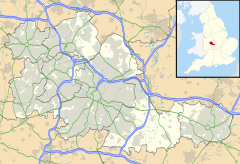Handsworth, Birmingham
| Handsworth | |
|---|---|
| Handsworth shown within the West Midlands | |
| OS grid reference | SP 040 896 |
| Metropolitan borough | |
| Metropolitan county | |
| Region | |
| Country | England |
| Sovereign state | United Kingdom |
| Post town | BIRMINGHAM |
| Postcode district | B20/B21 |
| Police | West Midlands |
| Fire | West Midlands |
| Ambulance | West Midlands |
| EU Parliament | West Midlands |
Handsworth (grid reference SP035905) is now an inner city, urban area of northwest Birmingham in the West Midlands. Handsworth lies just outside the Birmingham City Centre.
The name Handsworth originates from its Saxon owner Hondes and the Old English word weorthing, meaning farm or estate. It was recorded in the Domesday Survey of 1086, as a holding of William Fitz-Ansculf, the Lord of Dudley, although at that time it would only have been a very small village surrounded by farmland and extensive woodland.
Historically in the county of Staffordshire, it remained a small village from the 13th century to the 18th century. Accommodation was built for factory workers, the village quickly grew, and in 1851, there were more than 6,000 people living in the township. In that year, work began to build St James' Church. Later St Michael's Church was built as a daughter church to St James'. In the census of 1881, the town was recorded as having approx. 32,000 residents. By the census of 1911, this had more than doubled to 68,610.
The development of the built environment was sporadic and many of Handsworth's streets display a mixture of architectural types and periods – among them some of the finest Victorian buildings in the city. Handsworth has two grammar schools – Handsworth Grammar School and King Edward VI Handsworth School (for girls). St Andrew's Church is a listed building in Oxhill Road which also held Sunday school classes in a small building on the corner of Oxhill Road and Church Lane. It also contains Handsworth Park, which in 2006 underwent a major restoration, the vibrant shopping area of Soho Road and St. Mary's Church containing the remains of the founders of the Industrial Revolution - Watt, Murdoch and Boulton. The 1901 Red Lion public house was grade II* listed in 1985, but has been empty since 2008 and is considered "at risk".
...
Wikipedia

